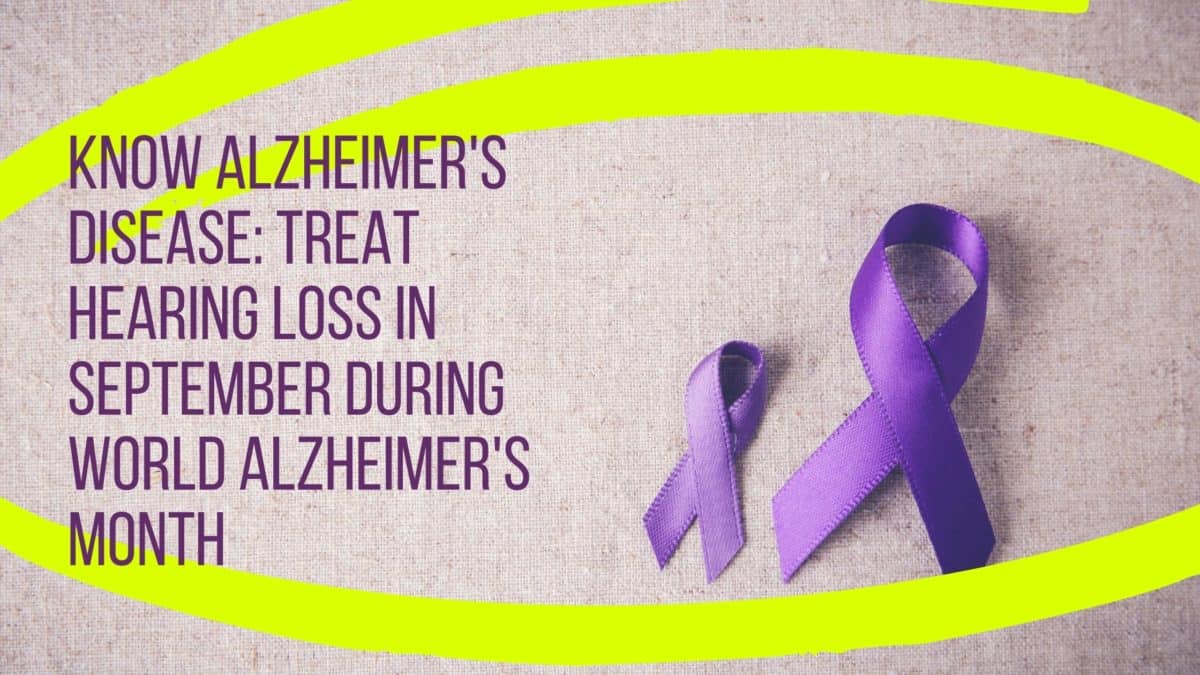- How Smoking Can Harm Your Ears - March 11, 2025
- Succeeding in the Workplace with Hearing Aids - February 10, 2025
- Welcoming the New Year with Better Hearing - January 2, 2025
An estimated 11 million Americans are providing unpaid care for someone with Alzheimer’s. If you are one of these many caregivers, World Alzheimer’s Month this September is a great opportunity to give you some recognition and gratitude for the essential service you provide. In addition, if you know someone who is doing this difficult work, take the opportunity of World Alzheimer’s Month to show how much you appreciate the care they provide.
Alzhiemer’s and other forms of dementia can look quite different from one person to the next, but there are some common warning signs to keep in mind. In addition to these warning signs, we can think about one of the important risk factors that shows a strong relationship with the likelihood of developing Alzheimer’s: untreated hearing loss.
One of the many ways to show your appreciation for these unpaid caregivers is to keep in mind the early warning signs and to do what you can to limit risk factors, such as untreated hearing loss. Seeking treatment shows powerful benefits for many people, but it also could be the key to reducing your risk of Alzheimer’s down the road.
Early Warning Signs
Some of the early warning signs will come as no surprise. Memory loss is one of the most common of these signs, but future Alzheimer’s patients are by no means the only people to have issues with their memories. Many seniors have memory loss of one kind or another, and young people are not exempt either. To add to this warning sign, other warning signs can complete the picture. Difficulties performing everyday tasks and locating items are known to be signs. Disorientation in time and place can occur, sometimes away from home and in other cases seemingly out of the blue. Problems connecting language and meaning are quite common warning signs, including forgetting common words. Once these processes begin, many people demonstrate other warning signs, such as shifts in mood and behavior or withdrawal from social events and workplace activities. If you notice these early warning signs in your loved one, that is by no means a diagnosis that Alzheimer’s is coming down the road, but it should prompt you to seek assistance from a doctor or cognitive specialist.
Hearing Loss and Alzheimer’s
In addition to warning signs, we can think in terms of risk factors that might lead to a higher likelihood of Alzheimer’s down the road. Similarly these risk factors do not mean that any individual will develop Alzheimer’s, but they function at the population level to show that more people with a certain lifestyle habit, health condition, or environmental setting develop Alzheimer’s than their demographic counterparts.
One of these risk factors that might come as a surprise is untreated hearing loss. At that statistical level of population averages, those who have untreated hearing loss are more likely to develop dementia, including Alzheimer’s, than those who are otherwise like them yet do not have hearing loss. Researchers and cognitive scientists are actively pursuing an explanation for this connection at the individual level. Studies have shown differences in brain activity between those who have hearing loss and those who do not, and it is possible that the regions of the brain that are responsible for complex thought and language processing are recruited for making sense of speech among those who have hearing loss.
Others describe the relationship in terms of cognitive load, while yet others think the common bond has more to do with social isolation. However, the connection works, study after study shows that untreated hearing loss has a powerful connection with Alzheimer’s. The good news is that those who consistently use hearing aids look no different from their counterparts when it comes to this connection with dementia.
Seeking Treatment For Hearing Loss
Getting treatment and putting it into action can preserve conversational ability and keep the brain active when it comes to language processing. If you have a loved one who has untreated hearing loss, perhaps this news will be enough to encourage a hearing test. The test itself is painless, quick, and easy, and the thorough diagnosis will point toward the appropriate types of hearing aids or other assistive technology when the time is right.


